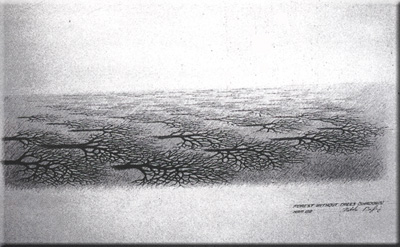
NICOLAI BUGLAJ Forest Without Trees 1982

|
The totality of human existence is circumscribed by amnesia. Our collective amnesia (that immense void in our universal history) is paralleled in our individual lives: in the absences in our memory of birth, of the first years of life, and in the myriad forgotten incidents of daily life. As Cesare Pavese expressed it, "We remember instants, not days." Amnesia is part of every gesture, every look, every attempt we make at remembering and thinking. It is not unconsciousness; it is a stalking presence that erodes, shapes, and refines our lives. Each one of our thoughts and memories has been molded and subverted by our amnesia. The world of amnesia and absences is a universe coexistent with the realm of memory and presences. W.B. Yeats noted our longing for what passes away, saying that "Man is in love, and loves what vanishes." Our amnesia, both personal and collective, implies a continual loss of everything that is ours or is near us: a world of irrecoverable lost objects. The scribes of Loén wrote about this: Found Objects may surprise us with their revealed qualities; Lost Objects pain us with the resplendence of their absence. The history of the world and of our lives is largely a process of discarding; we live on little details, we die on little details and we burn to live. Those shed objects glow with the incandescence of our inner selves. Our greatest loss has been the millions and millions of years unrecorded by history, touching on infinity: a vast expanse of immemoriality, or amnesia. This amnesia encompasses the enigma of the arts of Lost Objects. As such, these works of art are letters to amnesia - their intimations recover for us the sense of the infinite. They, like messengers of amnesia, flutter with the melancholy and joy of things that have become invisible. Without an awareness of amnesia, the arts do not have a complete vision. We are, in large measure, what we have lost and can never recover or recall. The history of amnesia as a theme is a vast crevice in time. It extends quietly and implacably across the thoughts of men and women who struggled to uphold the presence of their creations, of their expanding memory: their history. Many of those who have believed in a world previous to our birth often believed in a limbo of amnesia - a state or stage through which we all pass at the moment of our birth. For the ancient Chinese, it was a passage through the gates of Hell. There Lady Mêng compelled all souls reentering the wheel of transmigration to drink the Min-hun-t'ang, the Broth of Oblivion, which would erase all the memories of their previous lives and knowledge. Plato, in the fourth century B.C., amazingly coincided with this belief in his notion of anamnesis. For Plato, amnesia offered an epistemological explication: our learning in life is the shedding of the forgetfulness that overtook us at birth. All knowledge is a remembrance of the ideal realm that our soul knew before it came into this world. Another writer (or keeper of memories), Plutarch, in the first century, lamented that oblivion turns every occurrence into a nonoccurrence. In the sixteenth century, Michel de Montaigne bemoaned the aberration of memory caused by forgetfulness. In 1726, Jonathan Swift in Gulliver's Travels depicted a group of decadent men whose memory does not outlast the movement of their eyes from line to line of text: hence, they are condemned never to enjoy the pleasure of reading. Six years later the epigrammatic Dr. Thomas Fuller clustered in a phrase a fact everyone suspects or knows: "We have all forget more than we remember" (Gnomolia, 1732). In the nineteenth century, William Wordsworth revived in memorable verse Plato's notion of amnesia: "Our birth is but a sleep and forgetting" ("Intimations" Ode). Some years later Charles Baudelaire, following a long mystical tradition, would speak of the physical world as "a forest of symbols" whose meaning we have forgotten but that the poet can rediscover by means of his imagination. In the twentieth century, from the world of Ulysses, James Joyce tells us that "the idiosyncrasies of the poet are concomitant products of amnesia" The last four decades have offered several examples of writers who have treated the theme of amnesia. Among them we find Jorge Luis Borges, who in his short story "The Immortal" presents men condemned to immortality, decrepitude, and final oblivion of language. Gabriel Garcia Marquez in One Hundred Years of Solitude (1967) presents a void in memory from which language emerges and to which it returns. Milan Kundera in The Book of Laughter and Forgetting (1978) turns the theme into a gashing tool of political protest: we have forgotten because those in power have willed our oblivion by altering recorded history, by erasing traces. The elegiac tradition in poetry often dwells on the theme of forgetfulness. We find it in poets s diverse as Mimnermus of Colophon (seventh century B.C.), Sextus Propertius (first century B.C.), Chang Chi (eighth century B.C.) and, in modern times, John Milton (nineteenth century), Johann Wolfgang von Goethe (eighteenth and nineteenth centuries) and, in the twentieth century, Rainer Maria Rilke and Pedro Salinas.
Evidently, the theme abounds in all eras, and in modern times has overflowed
from literature into films, which use it primarily as a device to multiply
the possibilities of the plot and to create or heighten mystery and suspense.
The theme is ubiquitous, but its application as structure - as well
as theme - of artistic works is unique to the Amnesis movement.
|